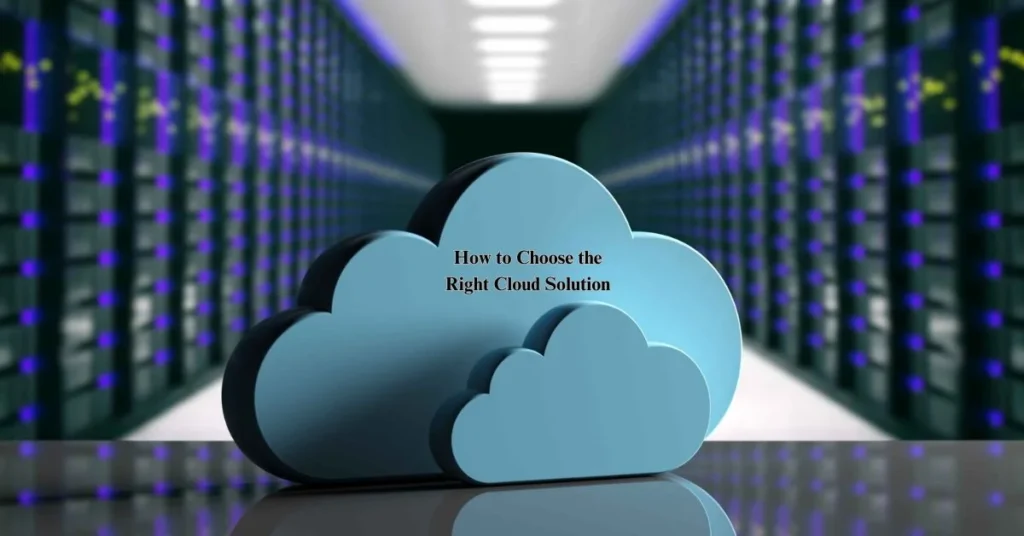Selecting the right cloud solution is a critical decision for businesses of all sizes. With so many options available, it’s easy to feel overwhelmed. However, choosing the right solution is crucial to enhance your organization’s efficiency, scalability, and security. This guide will help you understand how to select the ideal cloud solution that meets your business needs while ensuring you’re not overspending or sacrificing performance.
What is a Cloud Solution?

A cloud solution refers to a wide range of services, including applications, storage, and computing power, delivered over the internet. Unlike traditional on-premise systems, cloud solutions allow businesses to access powerful resources without the upfront cost of physical infrastructure. Cloud solutions are highly scalable and provide significant cost savings, making them a go-to option for businesses looking to modernize and streamline their operations.
Types of Cloud Solutions
Understanding the different types of cloud solutions is essential before making a decision. Here are the three primary models to consider:
1. Public Cloud
Public cloud solutions are hosted by third-party providers like Amazon Web Services (AWS), Microsoft Azure, or Google Cloud Platform (GCP). These clouds are shared across multiple organizations, offering flexibility and cost-effectiveness. Public clouds are ideal for businesses that need scalable resources but do not require a high level of customization or control.
2. Private Cloud
Private clouds are dedicated to a single organization, providing greater control, security, and customization. These solutions are often used by businesses with sensitive data or those that need to comply with strict regulations, such as healthcare or finance industries.
3. Hybrid Cloud
A hybrid cloud combines elements of both public and private clouds, allowing businesses to take advantage of the scalability of public clouds while maintaining control and security for sensitive data in private clouds. This solution is ideal for businesses with complex IT needs.
Key Factors to Consider When Choosing a Cloud Solution
Selecting the right cloud solution depends on your specific business needs. Here are the key factors to guide your decision-making:
1. Business Requirements
Start by assessing your business objectives. Does your organization need to scale quickly? Is security your primary concern? Or are you focused on minimizing costs? Identifying your core business needs will help you choose the right cloud service model. You can learn more about aligning business requirements with the right technology by visiting our detailed guide on cloud computing solutions.
2. Scalability and Flexibility
One of the biggest advantages of the cloud is its ability to scale. Ensure that the cloud solution you choose can grow with your business. A solution that offers on-demand resources, such as additional storage or computing power, will help you avoid future bottlenecks.
3. Security and Compliance
Security should be a top priority when choosing a cloud provider. Be sure to select a solution that provides robust encryption, data protection, and compliance with necessary industry regulations (e.g., GDPR, HIPAA). Many businesses, especially those in regulated industries, also need to ensure that their cloud provider has the necessary certifications and security measures in place.
4. Performance and Reliability
High availability and performance are critical for cloud solutions. Look for providers that offer Service Level Agreements (SLAs) that guarantee uptime and support. In addition, check the cloud provider’s global network of data centers to ensure they have the resources and infrastructure to meet your needs.
5. Cost-Efficiency
While cloud services can be cost-effective, it’s important to understand the pricing model. Some providers charge based on usage (pay-as-you-go), while others offer fixed pricing for more predictable expenses. Analyze your business’s usage patterns and select the pricing model that aligns with your budget.
6. Support and Customer Service
The quality of customer support is crucial when selecting a cloud provider. Look for providers that offer 24/7 customer service, ideally with specialized teams available to address your specific needs. Support can make a huge difference when you face technical issues or require configuration assistance.
7. Vendor Reputation and Experience
It’s essential to choose a cloud provider with a proven track record of delivering reliable services. Reputable providers such as AWS, Google Cloud, and Microsoft Azure have extensive experience and an established presence in the market. Check customer reviews and case studies to ensure the provider has experience in your industry and can deliver the performance and reliability you expect.
Benefits of Choosing the Right Cloud Solution

Choosing the right cloud solution brings several key benefits to your business:
- Cost Savings: Cloud services eliminate the need for significant upfront investments in hardware, reducing capital expenditure.
- Scalability: Cloud solutions can grow with your business, making it easier to adjust to changing demand without downtime.
- Enhanced Collaboration: Cloud-based tools enable employees to access documents and collaborate in real-time from anywhere.
- Disaster Recovery: Cloud providers often offer robust backup and disaster recovery features, ensuring business continuity in case of a failure.
Common Mistakes to Avoid When Choosing a Cloud Solution
When selecting a cloud solution, businesses often make mistakes that can impact performance and cost-efficiency:
- Underestimating Future Growth: Always choose a scalable solution that can grow with your business. Avoid selecting a solution that will require frequent upgrades.
- Ignoring Security Needs: Don’t sacrifice security for cost. Make sure the cloud solution you choose offers robust data protection and compliance with relevant regulations.
- Overlooking Vendor Support: Choose a provider that offers reliable customer support to assist you during critical issues.
Frequently Asked Questions (FAQ)
What is the difference between public and private cloud solutions?
Public cloud services are shared among multiple users and are typically offered by providers like AWS and Azure, while private clouds are dedicated to a single organization, offering enhanced security and customization.
How do I ensure my cloud solution is secure?
Look for cloud providers that offer encryption, multi-factor authentication, and compliance with industry-specific regulations such as GDPR or HIPAA. Always ensure that your cloud provider has robust security measures in place.
Can I migrate to another cloud provider in the future?
Yes, cloud migrations are possible, but they can be complex and costly. It’s essential to choose a cloud provider that offers flexible solutions and migration support.
Conclusion
Choosing the right cloud solution is more than just a technical decision—it’s a strategic one that can have a lasting impact on your business. By considering factors like scalability, security, cost-efficiency, and support, you can find a solution that meets your unique needs. Whether you’re looking for the flexibility of public cloud, the control of private cloud, or the best of both with hybrid cloud, the right choice will help drive your business forward.
Learn more about how to effectively invest in technology companies by exploring our detailed guide here.

